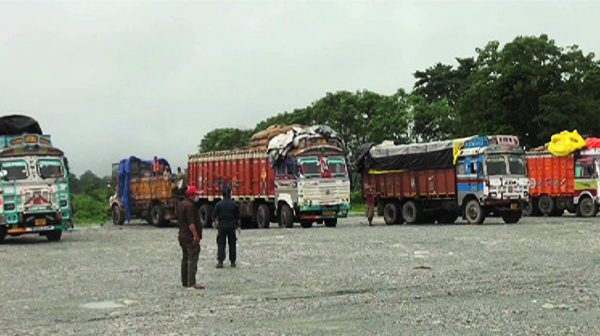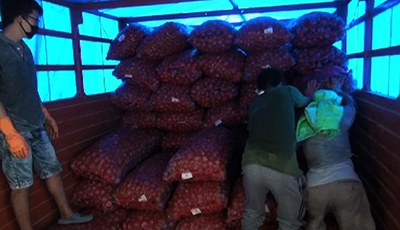
To the relief of many potato growers in western and central Bhutan, the Food Corporation of Bhutan’s auction yard in Gelephu resumed export from last week. But even as the crop’s trade arranged online picked pace instantly, it is yet to go as swiftly as expected. The dry port is currently faced with shortage of labourers to tranship potatoes from Bhutanese to Indian trucks.
Since the export restarted, around six to seven truckloads of potatoes from Bumthang and Phobjikha in Wangdue Phodrang reach the mini-dry port daily. There are some 30 Indian labourers involved in transhipping the consignments at the port. For the transporters, this strength of workers is not enough to keep up with the volume of cargo coming in.
“Lack of labour is the main reason for the delay in the transhipment of goods. There are around 15 labourers only. And only five of them are engaged for one truck. For three trucks loads, it takes more than two hours and on top of that, it rains a lot here. Moreover, they stop their work by 5 in the evening. Due to these reasons, we remain stuck here for five to six days,” said Tshering, a trucker.
According to Sarpang Dzongda, more workers will be recruited once the containment centre at the mini dry port is ready. There are around 50 youths in waiting list who earlier registered to work as loaders for the FCB.
“Once they star t working at the MDP, we don’t want to let them go back to their home. We want them to stay there. So that should anything bad happen to them, they don’t go and spread to others,” he said.
t working at the MDP, we don’t want to let them go back to their home. We want them to stay there. So that should anything bad happen to them, they don’t go and spread to others,” he said.
Remaining stuck at the mini dry port is not the only problem the truckers bringing in goods from various part of the country face.
They complain of a lack of clean drinking water and toilet facilities in the area.
“After reaching potatoes here, we are stuck for two days. Out here, there is no proper toilet facility and access to water. It becomes very difficult to find a toilet here in an emergency. It would be convenient for us to stay here if these problems are addressed,” said Gyamtsho, a trucker.
“We need to have a proper toilet and drinking water facility out here. When we are stuck here, we face difficulty in managing toilet and water. When there is no toilet, we have no other option than to opt to go to the forest,” added Changa Samdrup, also a trucker.
However, the Thromde Administration informed that they have already placed orders to procure fabricated toilets and other facilities from Kolkata. And for now, they will be provided with some temporary measures.
“These materials should be here in two to three weeks time. Once this is in place, we will have a proper resting place for the drivers, and hand-washing stations will also be set up. In the meantime, as we have more traffic coming in now because the export of potatoes from western and central Bhutan started coming to Gelegphu, we will install some temporary handwashing stations,” the Dzongda said.
Meanwhile, Indian trucks entering Bhutan are carefully disinfected at the entry point of the Bhutan-India border gate and then escorted to the transhipment area by police. Likewise, Indian drivers are not allowed to come out of their vehicle. After the exchange of goods, the Indian trucks are escorted back till the border gate.
Karma Wangdi










